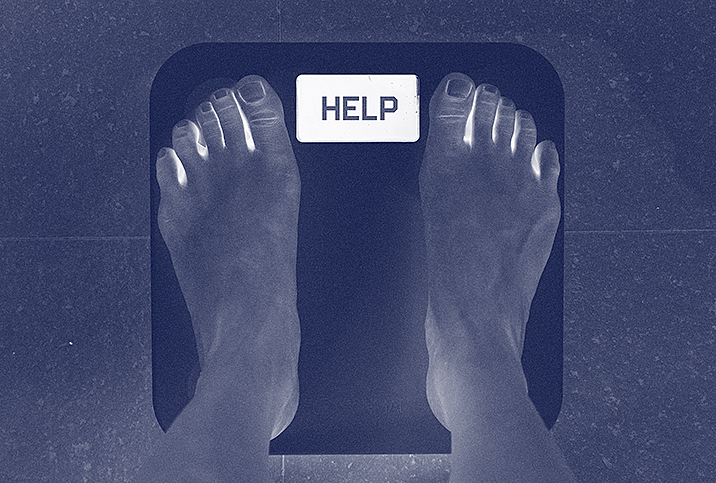Eating Disorders Can Affect Your Sex Life—Here's How to Get Intimacy Back

Many factors contribute to a satisfying intimate relationship, including our and our partner's self-esteem, trust, honesty and physical health. Adding something as complex as an eating disorder to the mix can easily upset the balance.
"Eating disorder" is an umbrella term for a wide range of conditions of which anorexia nervosa, bulimia nervosa and binge eating are the most common. However, individuals with eating disorders often share common characteristics such as distorted body image, low self-esteem, perfectionism and shame. The latter often have their roots in emotional, physical and sexual trauma. Physical intimacy, which depends upon so many of the factors that fall victim to eating disorders and their causes, often becomes collateral damage.
An eating disorder does not always lead to celibacy, but sex while suffering from one may not be healthy, safe or satisfying. While anorexia nervosa is characterized by mental and emotional rigidity and compulsivity that impedes sex, the impulsiveness that often accompanies bulimia can lead to hypersexuality and risk-taking. Other eating disorders can result in similar sexual dysfunction.
Untreated eating disorders can damage organs and systems in the body and lead to other diseases. Women with eating disorders often report symptoms of vaginismus, a condition involving painful, involuntary vaginal tightness, which may contribute to an inability to orgasm. Additionally, weight and nutrition affect the hormones that influence sexuality and libido. Malnutrition affects brain function and impedes the ovaries’ ability to properly produce estrogen and progesterone, which can create and worsen sexual dysfunction.
Mental health issues often accompany eating disorders and can also affect sexuality. Treating mental health issues with pharmaceuticals does little to improve sex drive but can do quite the opposite. Many of the medications used to treat depression, anxiety and other psychological disorders have a negative impact on sexual function.
Body image: an equal opportunity issue
Body image plays a crucial role in sexual experience and relations, especially for women, whether or not they were assigned female at birth. While research into body image in the LGBTQIA+ community is limited, the information that does exist shows transgender youth and adults struggle with body image and are at a greater risk for eating disorders than cisgender females.
Cisgender men aren't immune to the clutches of negative body image, disordered eating and fad dieting either, though research on them has so far been scant. The issue of body perception may be underestimated in this group, most of all due to cultural concepts of masculinity.
Get help with your eating disorder
A satisfying sex life is next to impossible without dealing with the root causes of discontent—in this case, your relationship with your body and food. Finding the right professional help will aid you in dealing with your eating disorder and its underlying factors.
With guidance and encouragement from a trained professional or treatment program, you can make peace with your perception of yourself, embark on a path to healthy eating and begin to improve your health.
Inviting intimacy into your life
When you are ready to welcome intimacy into your life, begin gradually. Some eating disorders are rooted in the denial of pleasure, including sensations caused by touch—a particular problem of anyone who has experienced physical trauma. Slowly experimenting with pleasurable, non-sexual touch, either alone or with a trusted partner, can be a tender first step in a journey to self-acceptance, discovery and increased emotional and physical intimacy.
Keep the lines of communication open with your partner. Let them know what feels good and safe to you, when you want to take the next step and when you need to slow things down. Recognize you and your partner may give and receive love differently, so take time to learn each other's love language.
Recovery from an eating disorder is a life-long journey. As you learn to make peace with yourself and improve your relationship with food, you will learn to become more comfortable in your body, trust your emotional and physical cues and identify your needs or desires. You will begin to identify what healthy sexuality looks like to you and share that with a trustworthy and patient partner. Exploring physical and emotional intimacy one step at a time will help you develop a positive attitude toward sex and the pleasures it can bring to your life.


















